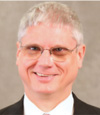August/September 2013
NSPE TODAY: OUTLOOK
The Race Continues
BY PRESIDENT ROBERT GREEN, P.E., F.NSPE
 Last year NSPE began the process of looking at itself and determining those things it did that were still relevant and those that weren't. It was not an easy process to start because we have so many programs that were initiated for very good reasons. However, times change, resources (money) become scarce, and we all must prioritize what we do. It was not, and is not, our goal to cut money from the budget; rather our goal is to reprogram funding to those areas where we can truly make a difference. With the input of many members and over 3,000 hours of work by task force members, we did make significant steps toward finding what makes NSPE relevant. But the process is not over; the race has just begun.
Last year NSPE began the process of looking at itself and determining those things it did that were still relevant and those that weren't. It was not an easy process to start because we have so many programs that were initiated for very good reasons. However, times change, resources (money) become scarce, and we all must prioritize what we do. It was not, and is not, our goal to cut money from the budget; rather our goal is to reprogram funding to those areas where we can truly make a difference. With the input of many members and over 3,000 hours of work by task force members, we did make significant steps toward finding what makes NSPE relevant. But the process is not over; the race has just begun.
We need to increase our membership numbers and we are working on ways to do that. However, while last year we focused, for the most part, on what was relevant to existing members, this year we will expand our focus to investigate what makes us relevant to external audiences—in other words, potential new members. To remain a vibrant organization that is advancing the engineering profession, we must remain important to more than simply our members. What we do is important to the profession, and we need to focus on those areas where we excel.
Two areas in which NSPE is very visible and effective is in government affairs and licensure advocacy. Our Legislative and Government Affairs Committee has been very active in promoting issues important to the engineering community, such as science, technology, engineering, and mathematics education, qualifications-based selection, and the critical need to improve our nation's infrastructure. Committee members have developed position statements on numerous engineering issues and assisted in drafting letters to legislators on proposed legislation. The NSPE Government Relations Office, in collaboration with the committee, works to modify proposed legislation and keeps members informed of pending legislative and regulatory actions. Similarly, the Licensure and Qualifications for Practice Committee has been developing a Body of Knowledge detailing the skills and knowledge all engineers should possess in order to function as professional engineers. The committee has also developed position statements to encourage the licensing of federal engineers and engineering faculty, and to promote efforts to restrict or eliminate the industrial exemption in PE statutes.
There are many other committees and task forces at work as well. They are all very effective in what they do and are making NSPE relevant in today's world. It is important that NSPE remain relevant and vigilant as economic forces work to focus more on the cost rather than on the quality of engineering services.
NSPE must also grow its membership, and we are committed to doing that through focused three-tier marketing efforts conducted in conjunction with state societies. Our strength lies in our local-state-national partnership, and we must ensure members see that synergy. Although we refer to ourselves as a three-tiered organization, we are really more interrelated and interdependent than we are tiered. We will strive to ensure members see NSPE as one unified organization consisting of three parts, all working toward a common goal.
There are no easy solutions to increasing membership. It is not simply developing a sales pitch, although we all do need to be able to articulate why we belong; it is about creating an organization in which people see value. It is about creating excitement that others want to have. It is about making people want to join NSPE for the opportunities we provide to make a difference in the world. We owe it to ourselves, to society, and to the profession to make NSPE just such an organization. We must ensure that NSPE is as relevant today as it was when we began.
At the recent meeting in Minneapolis, one of our keynote speakers, Dr. Jerry Emison, spoke about duty. His comments resonated with many in attendance who recognize that as professionals we do indeed have a duty to the profession. Without a doubt, we all recognize our duty to protect the health, safety, and welfare of the public, but this duty, this ethical obligation, does not apply only to our technical engineering work. It also applies to our work in protecting the profession, in encouraging others to join our ranks, and in ensuring legislation is enacted with the best technical advice possible. We must ensure that we serve the needs of all of our members: young and not so young, those in private practice and those in industry, education, and government, those who are licensed and those who are seeking licensure.
The National Society of Professional Engineers is a relevant organization today. We must work to ensure that it becomes even more relevant, remains relevant in the future, and remains the voice for engineers in the United States. As such, we will continue to work with other international engineering organizations to ensure we protect the professional status of engineering worldwide. Our future is bright and I look forward to an exciting year.
Interested in learning more about the events at the 2013 NSPE Leadership Conference and Annual Meeting? Go to www.nspe.org/AnnualMeeting.


